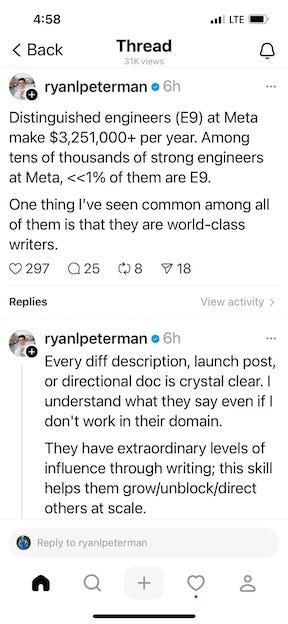Writing
Why leaders should take the time to write
Writing takes a lot of time. While I know, and no doubt you dear reader know as well, these articles aren’t amazing pieces of prose, but they do each take me several hours and multiple iterations to write. Like many of you, I’m fairly busy between my professional and personal commitments. So, why do I bother? I have had a few folks ask me this but usually in a more polite way by asking “how do I find the time?” In this article, I’ll try to answer those questions but also encourage you to write…and read, a lot.
To the question of time, I think that you can find the time for anything that you deem as important and I certainly do think writing for me is important. I, like many of you knowledge workers, primarily think for a living. I am certainly expected to get stuff done, hit goals and achieve targets, but that all requires a lot of thought. Talking with people in 1:1s, speaking to folks at All Hands meetings, asking questions during operations reviews, they all require one to spend a lot of time thinking. I think about what questions I want to ask to get to the heart of a matter quickly and I think about how to ask those questions to encourage a team and not discourage them.
Whether you are a product manager, a software engineer, or a marketer, you are spending a lot of your time listening, reading, and thinking. If you think your job entails a lot of doing, e.g. coding, designing, etc. remember what Abraham Lincoln was quoted as saying “Give me six hours to chop down a tree and I will spend the first four sharpening the ax.” The best of us spend an inordinate amount of time thinking before we take action. In a post on Stackexchange Workplace, a software engineer, that I suspect is pretty typical states:
I find that I spend, at most, 15% of my time actually writing code. The rest of the time, I'm researching the problem, investigating the data, discussing a problem with colleagues to figure out the best way to build something, reviewing other people's code, designing the architecture, configuring cloud resources etc etc etc. I find these tasks much more time consuming than writing code.
So even folks in our tech circles that we would normally think of as “doing” more and “thinking” less actually spend a great deal of time thinking.
This brings us to a statement by Leslie Lamport, an American computer scientist and mathematician. Lamport is best known for his seminal work in distributed systems, and as the initial developer of the document preparation system LaTeX and the author of its first manual. Lamport is quoted as saying, “If you're thinking without writing, you only think you're thinking." I love this quote because it summarizes exactly why I write. I write to clarify my thinking on a particular topic.
Writing forces me to structure my thoughts, test my ideas, and refine my arguments. It is a way of holding myself accountable to the discipline of thinking deeply. Writing clarifies the ambiguous, reveals the gaps in logic, and uncovers assumptions that might otherwise go unchallenged. This is particularly important in my role as a leader where decisions have far-reaching consequences. A well-articulated argument not only influences but also educates and inspires. Through writing, I can communicate complex ideas in a digestible format that can be revisited, scrutinized, and built upon.
In addition to the intellectual benefits, writing also serves as a personal record. It serves as a log of thoughts, lessons, and ideas that can be referred back to, much like a journal or a ship's log. This is especially useful when revisiting decisions or when new challenges arise that require reflection on past experiences. The act of writing down your thoughts solidifies them in a way that is different from just having a conversation or a meeting. It’s permanent, tangible, and transferable.
Now, as to why you should write, whether it’s for an audience or just for yourself, consider it an investment in your intellectual development. Even if you don't have plans to publish your thoughts, the process of writing itself is invaluable. It can help you become a better thinker, a more effective communicator, and a more introspective individual. Plus, over time, you build a body of work that reflects your journey, one that you can look back on to see how much you've grown, or even to laugh at your earlier self.
Moreover, writing isn’t just about the self. It’s also about contributing to the larger discourse. Your unique perspective, shaped by your experiences, can add value to someone else’s understanding of a topic. Think of all the things you’ve learned from others’ writings – articles, blogs, hopefully this newsletter. By writing, you’re joining a community of thinkers, contributing to the collective knowledge and potentially helping someone else think through a problem they’re facing.
However, if your role is more “hands on keyboard”, you still might be thinking that writing isn’t for you. If that’s the case, let me draw your attention to a recent post on threads by Ryan Peterman. The thread talks about the Distinguished Engineers at Meta and how they all possess “world-class” writing skills.
These engineers, despite being some of the most technically adept individuals at the company, are recognized not just for their ability to code but for their capacity to communicate complex technical ideas through writing. This isn't a coincidence. In fact, it's a crucial part of why they hold such prestigious roles. Writing forces clarity. It makes you slow down and consider the audience, ensuring that your ideas are not only well-formed but also accessible to others. In an environment like Meta, where collaboration across large, distributed teams is essential, clear writing becomes a powerful tool. It’s how these engineers influence decisions, drive initiatives, and share insights that might otherwise be trapped in their heads.
But it’s not just at Meta. Across the tech industry, the ability to write well is increasingly seen as a critical skill that transcends job titles and functions. Whether it's writing documentation that your team will rely on, crafting a technical blog post that shares your insights with the broader community, or drafting an email that clearly outlines a complex problem, writing is how you share your knowledge, how you lead, and how you make an impact beyond the immediate work at hand.
Take Amazon, for example, a company renowned not only for its technological innovation but also for its unique approach to decision-making and communication. At Amazon, the written word is so highly valued that meetings often start with everyone silently reading a carefully crafted six-page memo or narrative document. This "six-pager" is more than just a report; it’s a rigorously structured document that clearly lays out the problem, the data, the context, and the proposed solution. Writing such a document forces the author to think deeply, to anticipate questions, and to present their ideas in a way that is logical, coherent, and compelling.
This practice underscores how much Amazon values clear and concise writing as a tool for clarity of thought and effective decision-making. The six-pager ensures that everyone in the room starts the discussion on the same page, literally and figuratively. It democratizes the conversation by allowing the quality of the ideas to take center stage, rather than who can speak the loudest or dominate the conversation. By focusing on the written word, Amazon ensures that complex ideas are distilled into actionable insights that can be scrutinized, debated, and refined.
Across the tech landscape, from giants like Amazon and Meta to startups around the world, writing is increasingly being recognized as a core skill. It’s not just about being able to code or design; it’s about being able to communicate those ideas clearly and persuasively. In a field where complex problems are the norm, the ability to write well can make the difference between an idea that flounders and one that drives innovation. Whether you're documenting an API, writing a proposal for a new project, or simply explaining a technical issue to a non-technical audience, strong writing skills are essential to making your mark in the tech industry.
Even if you're not aiming to become a Distinguished Engineer or a senior leader, developing your writing skills can still offer tremendous benefits. It’s not about being the next Hemingway; it’s about being able to convey your thoughts clearly and persuasively, which in turn can open doors, whether it’s getting buy-in for a new project, communicating effectively with colleagues, or simply organizing your own thoughts.
So, to answer the original question, “How do I find the time?” I don’t find the time — I make the time. Writing is important to me because it’s integral to how I think, how I lead, and how I contribute to my community. And I believe it can be the same for you. Whether it’s to clarify your thoughts, to share your knowledge, or to document your journey, writing is a practice worth developing.
So, I challenge you to start writing. Start small if you need to. Maybe it’s a daily journal, a blog post, or even just thoughtful comments on articles you read. Over time, you’ll find that not only does writing help you think more clearly, but it also becomes a valuable tool for personal and professional growth. So, grab that pen, open that document, and begin. You might just be surprised at how it changes the way you think.




Brilliant! Thank you!